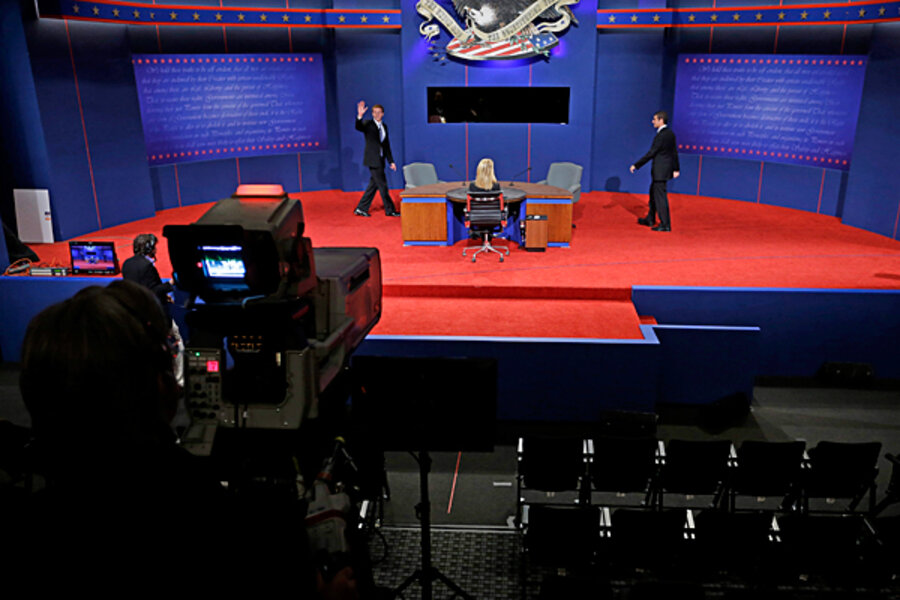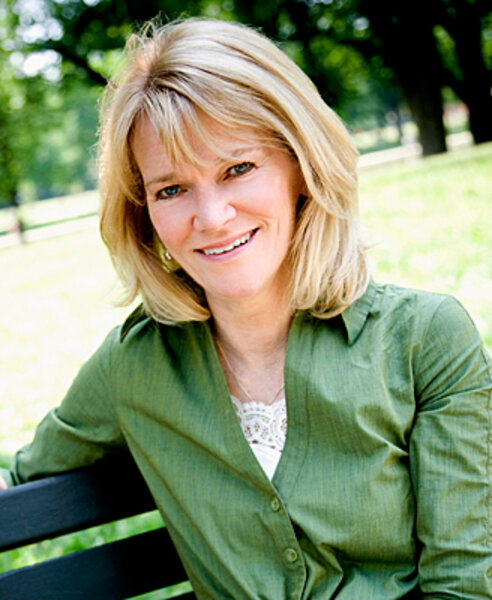Biden-Ryan debate: Already, some are complaining about the moderator
Loading...
| Los Angeles
Thursday night’s vice-presidential debate has not even begun, but at least one participant has already begun drawing heat from one political side: the moderator, ABC’s Martha Raddatz.
On Wednesday, the conservative Daily Caller posted a blog about Ms. Raddatz, alleging bias because of her short-lived marriage in the 1990s to an Obama administration appointee, Julius Genachowski, the head of the Federal Communications Commission.
This shot comes on the heels of an avalanche of criticism aimed at last week’s presidential debate moderator, Jim Lehrer, ranging from GOP commentator Laura Ingraham to Democratic contributor Bill Maher.
“There have always been questions about moderators,” says Atlanta-based GOP strategist David Johnson, who consulted on Bob Dole’s 1988 presidential campaign. Targeting moderators is simply a political strategy, he says, giving “each side a way to say, the debate was stacked against them if their candidates don’t do well.”
Mounting such a strategy before the debate even starts, Mr. Johnson adds, “makes the moderators go out of their way to be evenhanded.”
In one of the GOP debates earlier this year, CNN’s John King took withering heat for asking Newt Gingrich about allegations made by his second wife. A variety of sources challenged Gwen Ifill’s objectivity in 2008 because she had written a book related to Barack Obama.
Now, both ABC News and the Commission on Presidential Debates have dismissed charges of bias against Raddatz, a senior foreign affairs correspondent. As reported in Politico Wednesday, The Washington Post’s conservative Jennifer Rubin tweeted that “this whole mini flap was obnoxious, dumb.”
Still, taking down a particular moderator can have the beneficial result of lowering expectations, which can then be more easily exceeded, says Ed Uravic, a former Washington lobbyist and currently a faculty member at Harrisburg University of Science and Technology in Pennsylvania. “It can potentially soften up the moderator and prevent her from hitting the candidate with hard or embarrassing questions (though that did not appear to work with Gwen Ifill, and she did seem to have a conflict given her book about Obama),” he writes in an e-mail.
Indeed candidates, and especially their surrogates, sometimes try to “fire a shot over the bow” of a moderator to ensure the moderator’s objectivity, says presidential scholar Charles Dunn, dean of the Robertson School of Government at Regent University in Virginia Beach, Va. This is what “Romney-Ryan surrogates have done to Martha Raddatz before the Biden-Ryan debate,” he writes in an e-mail. “And sometimes afterward surrogates may to excuse their candidate’s poor performance by blaming it on the moderator, which Obama’s surrogate [deputy campaign manager] Stephanie Cutter did to Jim Lehrer.”
This is “a way of working the refs, just the way the Green Bay Packers did,” says David Mark, editor in chief of the political news site Politix. “It’s a way of saying, it wasn’t our fault because the ref was biased.”
Particularly with vice-presidential debates, Mr. Mark points out, “this is a way of trying to win on the margins.” The vice-presidential candidates are not really talking about themselves, he notes, but rather “are supposed to be talking up their bosses, so this is a way to distinguish themselves” from their opponent.
Moderators are an easy target partly because their role morphs each time out of the gate, points out Robert Thompson, founder of the Bleier Center for Television and Popular Culture at Syracuse University in New York. “The role of the moderator gets to be made up by whoever has input on the format of the debate,” he points out. At first, Mr. Lehrer was dubbed the worst moderator in history, he says, but “that view is changing.”
“Defenders of Jim Lehrer are saying a moderator should be invisible,” he notes. But others contend that “moderators should insert themselves more into the process, controlling the back and forth and asking more aggressive questions,” Mr. Thompson says.
The scrutiny of the moderator also points to another growing trend, the elevation and, at times, polarization of the media in the political process, Johnson says. More than ever before in the history of mass media, he says, US media are no longer perceived as being objective. He points to a recent Pew poll that showed 60 percent of the public does not trust the media.
“The media is perceived as being part of the political process,” says Johnson, pointing to liberal and conservative cable channels such as MSNBC and Fox News. “So it’s getting harder for the American public to believe that there isn’t bias going into these debates.”
Tapping into distrust and suspicion about the media helps stir up the Republican base, Johnson points out. “So it’s not surprising to see it happening even before the debates take place.”








